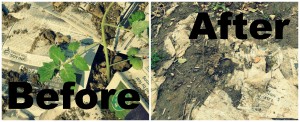When you think of mulch, wood chips are probably the first thing that comes to mind. But mulch is anything that provides cover for your soil.
Mulches are used to control weeds and plant diseases. They help maintain soil moisture and regulate temperature. Using compost or cover crops as mulch adds organic matter to soil. In landscaping, mulch is often applied for aesthetic purposes. Nothing looks more fresh and finished than a layer of rich, dark mulch!
Common Mulches
Wood chips and bark. Tree and shrub roots are mostly contained in the top two feet of ground. Applying wood chip mulch at the base of trees and shrubs protects roots and prevents root exposure.
Wood chip mulch between garden rows minimizes soil compaction in high traffic areas. Since wood chips take years to decompose, this kind of mulch works best in raised bed gardens where mulch won’t mix with soil and hinder future planting.
Newspaper. Un-glossy newspapers are typically printed with soy-based ink, which is harmless to soil and plants. To use newspaper as mulch, layer 2-5 sheets around plant base. Weigh papers down with dirt or a heavier layer of lawn waste.

Straw is my favorite mulch for overwintering alliums. It also makes a great mulch for potato plants because it prevents sunlight exposure, which causes taters to turn green and toxic.
Plastic or landscaping fabric can be used to choke out weeds and prepare a surface for planting without tillage. It also warms soil, allowing gardeners to plant warm weather crops earlier.
Plastic maintains soil moisture but also prevents the ground from absorbing irrigation. Remember, plants drink through roots, not leaves. Run drip irrigation lines under plastic or cut plastic to leave more ground exposed to irrigation.
Plastic mulch has a reputation of being environmentally unfriendly. I get at least three seasons use before disposing of plastic by pulling it up after the season has ended and storing it in my dry hayloft.
Grass clippings, leaves and yard waste make free and effective mulch. Allow clippings to dry before application. Mix grass and leaves with heavier components, such as finished compost, to keep mulch from blowing away.
Other mulches to consider
- Living green mulches/cover crops: clover, rye, triticale or wheat
- Sawdust
- Moss
- Pine needles
- Moldy forest leaves
- Hay
- Hulls
- Cardboard
- Compost












I didn’t know that wood chips can take so long to discompose. How would it hinder further planting? I wouldn’t want to risk the future of my flower beds.
Straw, newspaper and lawn clippings decompose easily and can be worked into the soil before next planting; wood chips don’t. If you try to till wood mulch in, your shovel will be detoured by chunks of wood the following season.
Wood chip mulch is not the best choice for annuals. But it is my mulch of choice in perennial gardens that don’t require frequent replanting. It also looks great around permanent trees and shrubs!
Thanks for posting this information! I’ve tried a few different types of mulch, but they haven’t been very effective in providing the nutrients that my lawn needs. I’m looking for a different type of mulch to make my lawn look more green and healthy. It’s interesting that sawdust can be used as mulch. How will it make my lawn and garden grow to look more healthy? I would like to know that benefits of using sawdust before trying it out.
Sawdust is lightweight, economical and insulating. Alone it makes a good mulch for acid loving plants and evergreens. Alternatively, it makes a great carbon ingredient to add to the compost pile.
My gardens have always been a little dull, and I wanted to see if there was something I could do in the spring to help them out. It’s interesting that mulch is actually used to control weeds and plant diseases. We will have to buy some and put it down when the flowers come back.
It’s great that you’ve pointed out that straw is a great mulch for potato plants because it prevents sunlight exposure. I also want to grow potatoes in my backyard; knowing that straw mulch is effective for this kind of plant has really been helpful. I’ll look for a landscaping company that offers straw mulch.
I hadn’t realized how important it could be for potatoes to avoid sunlight, so I appreciate that you said that straw will be a good option for that. We are looking for the right mulch for our garden, and we will be considering getting potatoes. If we do grow potatoes, I will be sure to consider using straw mulch.